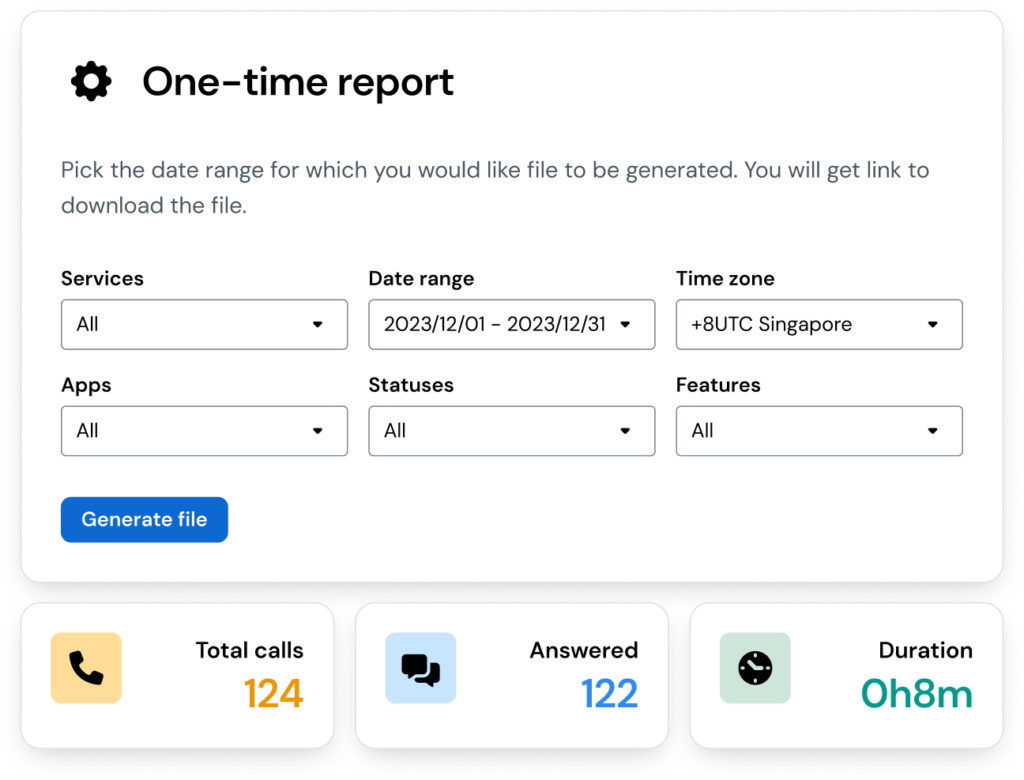Products
Genesys BYOC: Your guide to bringing your own carrier to Genesys Cloud

Products

For many enterprise businesses, choosing Genesys Cloud is an easy decision to make. Genesys is the leading global contact center solution and offers flexibility, cost control, and seamless customer interactions.
But when it comes to finding the best calling services to power your Genesys contact center, it isn’t always that straightforward. New and existing Genesys users often find that choosing the best calling plan is one big task with many questions.
What are the benefits of bringing your own carrier (BYOC) to Genesys versus using Genesys Cloud Voice? How does BYOC work? And, most importantly: What is the best carrier to bring to Genesys Cloud?
In this article, we’ll take a closer look at Genesys BYOC and explain in detail what to consider for your migration or implementation.
Before we jump into the Genesys BYOC process, you might wonder if bringing your own carrier to Genesys Cloud is the right move or if using Genesys Cloud Voice is a better option.
Genesys Cloud Voice provides basic telephony services to connect to the public switched telephone network (PSTN), which includes local numbers, toll-free numbers, outbound calling, inbound calling, porting, and emergency services.
So, you might initially consider using Genesys Cloud Voice, but BYOC brings several advantages. Bringing your own carrier to Genesys allows you to maintain control over your telephony setup. You’ll benefit from greater reliability on a carrier network and get access to voice services at a lower rate.
Lower costs are one of the big benefits of BYOC. Depending on the provider and calling plan, enterprise businesses can lower their total telecom spend with BYOC. For example, new Genesys Cloud customers can choose to maintain their ongoing relationship with their existing carrier, keeping any price advantages, and avoiding termination fees for ending a contract. Existing Genesys customers can also benefit from shifting to direct-to-carrier, as they’ll often get better rates.
Bringing your own carrier to Genesys Cloud also allows you to choose a partner that best meets your needs. By selecting your own voice provider, you gain access to additional features and capabilities along with the reliability and scalability a trusted carrier can offer.
Overall, the BYOC option allows you to stay flexible, keep costs low, and leverage a robust voice infrastructure – key factors to ensure business continuity and provide high-quality customer service.
That’s exactly why so many companies choose this option. So, let’s look at how Genesys BYOC works and how to find the right carrier.
With BYOC, you connect your SIP carrier trunks to Genesys Cloud in Amazon Web Services (AWS). Genesys provides a BYOC quick start guide for this, and depending on your carrier, you’ll have additional documentation to configure the SIP trunks.
Once your SIP trunks and Genesys Cloud Voice are configured, you will be able to make and receive calls from your contact center. The following diagram shows how SIP trunks are connected to Genesys Cloud.

Whether you’re migrating from an on-premises solution or switching between cloud providers, Genesys BYOC Cloud allows you to set up direct SIP trunk connections between your carrier and Genesys’ cloud infrastructure. That’s why a robust SIP trunk service is so important for Genesys BYOC.
Pro tip : Looking for information on how to integrate elastic SIP trunking with the Genesys Purecloud Platform? In this documentation, we walk you through the integration process with Sinch.
If you’re looking for a new carrier for Genesys Cloud, you’re probably wondering what to look out for. These are a few key ideas you’ll need to keep top-of-mind to find the best partner for your needs.
If you’re looking for a voice partner, select a carrier that offers full network diversity and redundancy. These give you resiliency to ensure that your services are reliable and always available.
Ideally, opt for a carrier that owns and operates their own network, like Sinch. Using a facilities-based carrier means your provider will have end-to-end control and visibility, offering higher scalability and a more seamless experience.

The carrier you choose should give you direct access to their Network Operations Center (NOC) and technical support to help quickly diagnose and correct any issues that may occur.
Ensure that your provider has experienced implementation managers that can help guide you through the process. Be wary of the ones that charge a premium fee for different levels of support. As part of your service, you should always have access to resources that help you manage and maintain your environment.
Keep BYOC hassle-free by working with a carrier that can help you port numbers easily.
At Sinch, for example, you can simply port numbers within the Sinch Dashboard. Sinch also has an experienced porting team to help manage large migration projects when needed.
“We’ve ported numbers for 16 years now and have never come across a porting team so easy to work with – they make the impossible possible.”
There’s more to voice services than just making and receiving calls. When looking for a partner, watch out for its real-time visibility and debugging tools so you can monitor call performance, troubleshoot issues, and access comprehensive call detail records.
Choose a carrier that offers Packet Capture (PCAP). This provides you with detailed SIP signaling for every call, so you obtain key diagnostic technical information to quickly resolve any call-related issues. Also look out for analytics features, which allow you to access valuable data on your calling patterns.

And last, but not least, pick a provider that offers security by design. Keeping your customers and employees safe is critical in our current digital landscape, where threats are common and varied.
Sinch, for instance, provides multiple authentication methods, including access control lists and SIP authorization. Sinch also offers TLS/SRTP to encrypt calls, which can be turned on with the click of a button.
To protect your enterprise business, SIP trunk services for your Contact Center as a Service solution (CCaaS) should be reliable, highly available, and fully redundant to prevent any points of failure.
For Genesys BYOC, here are some additional features to look for.
Compliance with local regulations is critical when choosing a carrier. Your SIP trunk provider should be STIR/SHAKEN-compliant to reduce robocalls and offer emergency 911 services.
When you’re looking for a reliable and flexible SIP trunk integration to your Genesys Cloud environment, elastic SIP trunking is a great way to go.
In a contact center, call volume may vary drastically between busy call times and slower ones. Elastic SIP trunks provide unlimited call sessions that allow you to stay flexible. That way, you never have to worry about how many sessions you need or about blocked calls during peak times.
At Sinch, our Elastic SIP Trunks utilize our own voice network (the largest in the U.S.), built with full redundancy.
Sinch Elastic SIP Trunks are built in AWS, same as Genesys Cloud. This is an advantage because it reduces latency when connected to the Genesys Cloud infrastructure, increasing performance and reliability. You can also find Sinch’s Elastic SIP Trunk offering in the Genesys AppFoundry.
Look for SIP trunks that you can build in real time, rather than having to wait for a provider to provision them. This gives you more flexibility and full control.
With Sinch, for example, you’ll be able to build Elastic SIP Trunks directly in the robust Sinch Dashboard in minutes. Sinch also provides rest APIs for Elastic SIP Trunks that can be utilized to automate all functions that are available in the Dashboard.
When considering BYOC for Genesys Cloud, it’s crucial to pick a partner that brings you the most reliable voice infrastructure for your cloud-based contact center and allows you to maintain the economic benefits they provide.
That’s where Sinch stands out. Sinch offers reliable, high-quality Elastic SIP Trunks that are easily configured and maintained by our experienced support team. We also own and operate our voice network in the U.S. and terminate over 100 billion calls yearly for over 150,000 customers. Our enterprise-grade infrastructure and robust set of APIs provide full redundancy and scalability, with over 160 million active phone numbers.
Ready to make the move? Whether you’re looking for support with SIP trunk integration or are considering Sinch as your carrier of choice, our team is ready to guide you through the Genesys BYOC process, every step of the way.
Get in touch to learn how you can gain more control over your telephony services and reduce telecom costs with Sinch.